Sauvons la forêt ancestrale du peuple Ekuri au Nigéria !
La forêt vierge de l’État de Cross River est un véritable paradis avec ses arbres géants, ses chimpanzés et ses éléphants d’Afrique. Mais le territoire ancestral du peuple Ekuri pourrait être détruit pour la construction d’une autoroute complètement inutile. Les bulldozers sont arrivés. Les Ekuri lancent un ultime SOS. Soutenez-les !
Mises à jour AppelAu Président et à la ministre de l’environnement du Nigéria, au gouverneur de l’État de Cross River
“Merci de stopper les défrichages à Cross River et de projeter une autre route dont le tracé préservera la forêt ancestrale du peuple Ekuri”
Les derniers géants de la forêt vierge s’élancent majestueusement vers le ciel. Tout autour, arbres et arbustes ont été abattus sur des centaines de mètres à l’aide de bulldozers. Martins, Moses et Leo du peuple des Ekuri se déplacent en silence à travers la zone défrichée qui accueillait auparavant une jungle impénétrable. « Si on laisse la forêt tranquille, la nature reconquerra le terrain perdu », assure Martins.
Le responsable de la déforestation est Ben Ayade, le gouverneur de l’État de Cross River. Il est à l’origine d’un projet d’autoroute de 260 km reliant la ville côtière de Calabar à Katsina Ala. Cette route traversant la forêt des Ekuri menacerait l’équilibre du parc de Cross River et mettrait en péril le Sanctuaire de Faune du mont Afi.
Des activistes nigérians pensent que le projet d’autoroute n’est qu’un prétexte. Sa raison d’être serait de permettre aux bûcherons d’accéder aux forêts vierges. Le fait que le gouverneur ait saisi une bande de terre de 20 km de large le long de la route prévue est révélateur. « On nous vole notre forêt » se plaignent les autochtones. Certains redoutent que des plantations de palmiers à huile voient le jour après la coupe à blanc.
Face aux protestations, le gouverneur a dû annuler les expropriations et proposer un tracé contournant les grandes zones forestières. Le gouvernement fédéral a accepté la construction à des conditions très strictes, quasiment irréalisables.
En novembre 2018, plusieurs bulldozers étaient malgré tout à pied d’œuvre. Le gouverneur s’est soustrait en toute illégalité aux conditions fixées !
« Cette autoroute signerait l’arrêt de mort de notre forêt », s’alarme l’écologiste Odigha Odigha. « Nous allons défendre notre terre-mère ».
Les Ekuri sont déterminés à poursuivre la lutte et en appellent à notre soutien.
ContexteSources et informations supplémentaires
- Article de Sciences et Avenir Au Nigeria, Cross River Park, le dernier eden menacé
- Vidéo de France 24 Au Nigeria, un projet d’autoroute menace la forêt de l’État de Cross River
World Rainforest Movement (WRM)
- Présentation de pétition Arrêter La Destruction De La Forêt Tropicale Ancestrale Des Ekuri
- Article Nigeria: un exemple unique de gestion communautaire des forêts dans la communauté d’Ekuri
- Bulletin mensuel mars 2016 Nigeria - Des forêts au plus offrant : REDD s’avère incapable de freiner le déboisement
En anglais
La page internet Save Ekuri Forest met à disposition plans, photos et informations détaillées sur le peuple Ekuri et son habitat menacé.
- Article de Mongabay Cross River superhighway changes course in Nigeria
- Article du Earth Island Journal A Nigerian Superhighway Project Threatens a Critical Rainforest and Its People
- Article de Mongabay Nigerian government urged to halt “land grab” in Ekuri community forest
- Article du Premium Times Cross River’s Ekuri community protests destruction of ‘33,600 hectares of forest by Super Highway’
- Article du Daily Post Dialogue with bulldozers at Ekuri Community Forest
Destinataires de la pétition
En plus de signer la pétition, il vous est possible de contacter directement ses destinataires :
- M. Muhammadu Buhari, Président de la République Fédérale du Nigeria
- M. Usman J. Ibrahim, Ministre de l’Environnement de la République Fédérale du Nigeria
- M. Ben Ayade, Gouverneur de l’État de Cross River
Ambassade du Nigéria
173, avenue Victor Hugo
75116 Paris
Tel : + 33 (0)1 47 04 68 65
Courriel ambassade : embassy@nigeriafrance.com
Courriel ministre Mohammed : amina.mohammed@environment.gov.ng
Courriel gouverneur Ayade : ayadeleon@gmail.com
Il vous est aussi possible d’écrire au président Buhari directement sur les réseaux sociaux :
Facebook: https://www.facebook.com/votebuhari/
Twitter: https://twitter.com/mbuhari
Communiqué de presse (en anglais)
L’organisation non gouvernementale Ekuri Initiative a publié un communiqué de presse contenant de nombreuses questions relatives au financement, à l’histoire aux détails techniques de l’autoroute projetée.
PRESS RELEASE
Cross River Superhighway destroys the forest and lives of the Ekuri people and thousands others
The unique Ekuri people and the precious Cross River rainforests
The people of Ekuri live in Cross River State, deep in the heart of one of Nigeria’s last surviving rainforests. Their forest is sandwiched by the Ukpon forest reserve to the north and Cross River National Park to the east and south and to the west by the Iko Esai community forest. Their rainforests are spectacular and are home to a number of rare and endangered wildlife species including Nigeria-Cameroon chimpanzee, some of the last forest elephants in West Africa and forest buffalo. However, all of this is about to disappear forever due to the construction of the Cross River State Superhighway which will destroy the ancestral lands and forests of the Ekuri people and thousands of others along the proposed 260 km route.
The villages of Old Ekuri and New Ekuri (popularly called the “Ekuri Community”) are located in Akamkpa LGA, in the buffer zone of Cross River National Park. These are two of only five villages in the whole world that speak the Lokoli language. These two villages between them jointly own 33,600 ha of community forest. This is probably the largest community owned forest in all of West Africa. For hundreds of years, the Ekuri people have relied completely on their ancestral lands and forests for everything. The forest provides the people with fruits, vegetables and a wide range of other valuable forest products. It also provides fertile farmland, their medicines and shapes their unique culture, language, and identity.
These forests are so important to the Ekuri people that in the early 1990s when they were approached by two logging companies offering to build them a road in exchange for logging their forest, they said “No”. Instead they asked the World Wide Fund (WWF) for Nature and the UK’s Overseas Development Administration (now the Department for International Development (DFID)), to help them set up a forest management organisation called the Ekuri Initiative. This community-run body has been instrumental in managing the Ekuri forests and also successfully brought development benefits to their villages including the construction of a 30 km road to the villages and the establishment of a health centre. This was so successful that in 2004, the Ekuri Community received the highly prestigious Equator Initiative Award from the United Nations Development Programme (UNDP) for their outstanding contribution to biodiversity conservation and poverty reduction.
The forests of CRS are globally recognised for their international importance as one of the richest sites for biodiversity in Africa. The World Wide Fund for Nature and other NGOs have documented the fact that they harbour an enormous diversity of plant and animal species almost unmatched anywhere else in the world. In recognition of this, the UK government invested millions of pounds into the Cross River State Forestry Department in the 1990s. WWF also invested millions of pounds into the establishment of Cross River National Park over a period of 7 years. More recently, the UN established the UN-REDD programme in Nigeria with Cross River State as the first pilot state in which to establish structures to channel carbon credit funds from the world to reward the State for actions to protect these globally important forests. It is hoped to expand this programme across Nigeria.
But now this forest and the entire Ekuri way of life, is threatened with destruction.
Outcry after highway route announced but launched by President Buhari eventually
Last year, the newly elected Governor of Cross River State, Senator Ben Ayade announced the construction of a 260 km superhighway to go from a planned deep sea port in Esighi in Bakassi Local Government Area northwards via Obudu to Katsina-ala in Benue State. The superhighway was to be toll road to be built at the cost of US$3.5 billion and was to be constructed by a company called Broad Spectrum Industrial Services Limited (BSIS) who are based either in Israel, Germany or Port Harcourt depending on various newspaper articles.
When a map was released by the state government showing the proposed route of the superhighway, it showed it passing through the mountainous Oban Division of Cross River National Park. Besides the fact that the proposed route was going to cause untold damage to the globally important park, it also demonstrated that the route had been selected without looking at a contour map, let alone having an engineering survey!
This led to an outcry from the National Park authorities, the Federal Ministry of Environment and many Nigerian and international NGOs. The NGO community was so outraged by the threat of the superhighway to the National Park and to the forest communities that they got together to write a letter to the Governor. The letter dated 20th October 2015, was written and signed by the Friends of the Earth Nigeria (FoEN), Nigerian Conservation Foundation (NCF), Zoological Society of London (ZSL), Birdlife International, Wildlife Conservation Society (WCS) and the Heinrich Boell Foundation and was copied to President Buhari and the Federal Minister of Environment. These letters received no reply.
Nevertheless as a result of the outcry from various quarters, the Governor then directed that the road should pass around the park. When the highway was first announced, the Governor had made it clear that he wanted the President to flag off the construction. Due to the outcry, President Buhari initially decided not to open the superhighway. However, once the road was diverted around the Park, this seems to have allayed his fears and he eventually visited Cross River State to launch the superhighway on the 20th October 2015.
The route was still far from ideal, so questions started to be asked
While the route around the National Park was a better outcome than the initial route, it was clear that the road still passed too close to its boundary and right through the Ekuri forests and protected forest reserves. It is well known that any road can open up a trail of destruction in the form of logging, hunting and farming and soon the forest within at least 5km of any road is totally destroyed. So it was clear that the road, even with the new route, would still cause huge damage and destruction to the National Park and the forest communities it passed through including the 33,600 ha Ekuri forest.
At this point, people in Cross River State began to ask questions about the superhighway:
What kind of company is Broad Spectrum Industries Limited? Many efforts have been made to investigate the background of the Company to find out what its track record was in highway and infrastructure construction. However, its website indicates that the Company, based in Port Harcourt, is relatively new and has no experience in road or port construction. How could such a huge project of this nature be handled by a company that no one has heard of before? Who is on the Board of the Company, what are its credentials and what was really its interest in the project?
Questions around the funding and the economics of the project: It was alleged in the press at the time, that BSIS was going to invest 700 billion Naira (US$3.5 billion) in the deep sea port and superhighway. However, it is unclear where this staggering sum of money is meant to be coming from. It was rumoured that the funds were potentially coming from Germany or the UK or Israel but all efforts to find out more about the alleged funding for the superhighway construction project have proved futile. There are also reports of contributions from Heritage, Skye and Zenith banks. Do the funds for the construction of the highway actually exist? What kind of company would spend US$3.5 Billion on the construction of a port/superhighway if the port will only pay back US$30 million a year? This would thus take over 100 years to pay back and that’s not including a discount rate! What kind of company would invest such large sums of money with such bad returns? There has been no transparency on this aspect of the Project.
Questions about the engineering feasibility of the Project: It is notable that there do not seem to have been any engineering studies carried out to inform the design of the Project. If there have been engineering studies, they have also been kept secret. The communities along the proposed route all attest that there have been no engineers surveying on the ground. Without such surveys how can one even determine the cost of the superhighway? How would one know, for example, how many substantial bridges are required or how many millions of tons of rock and soil have to be moved to pass through the hilly terrain? However, it is clear from contour maps that the terrain of the proposed route passes though some of the hilliest terrain in the entire country. This is slightly better than the mountainous route that was originally proposed through the heart of the National Park but such lack of basic research calls into questions the seriousness of the actual plan to build such a highway. How can a scheme of this size not be based on any field-based engineering surveys?
Why has there been no Environmental Impact Assessment or public consultation on the route? The Environmental Impact Assessment (EIA) Act of 1992 specifies that any construction project that is likely to have a significant impact on the environment or on people MUST have an EIA carried out and must receive an environmental permit from the Federal Ministry of Environment (FMEnv) BEFORE forest clearance works of any sort take place. Such an EIA must involve documented consultation meetings with a wide range of affected stakeholders before the final project design is concluded and approved. So, given the huge impact this Project will have on one of Nigeria’s last surviving rainforests and the impact on the lives of thousands of people, how can such a scheme go ahead without an EIA which is made publicly available? If an EIA has been carried out who was consulted? Certainly none of the many communities or environmental NGOs have been consulted about the route. Reports from the villages say the superhighway construction has been awarded to several local contractors who are able to hire bulldozers. The local contractors have been apportioned 10 km each to bulldoze. How can clearance of the forests for the route commence be allowed without an EIA permit from the Federal Government?
Why not upgrade the existing Calabar-Ikom-Obudu highway? The existing Federal Highway from Calabar through Ikom to Obudu already serves all the purposes that the government wants the super highway to achieve. It links Calabar with Benue State and provides the route for trade. Communities and trade routes already exist around this road, whilst the super highway would necessitate new feeder roads, which would cut more into the rain forest. Furthermore this would be much less costly and will do far less damage to the State’s forests and communities.
The announcement in the newspapers of the 20km revocation of land rights
For a number of months after President Buhari launched the superhighway, everything went quiet and it was suspected that the highway might no longer happen. Then on 22nd January in 'The Weekend Chronicle', the State Government announced that a 20km setback of land would be compulsorily acquired by the Government “in the over-riding public interest” along the entire 260 km Right of Way from Bakassi to Katsina-ala (see map)!
As one can imagine, the forest communities were absolutely horrified to read this. The Ekuri people immediately knew that the superhighway would rip through the heart of their forest, opening it up to farming, logging and hunting on a massive scale. It was shocking that, in this unprecedented massive land grab, the Governor has seized all the ancestral land of thousands of forest dependent villagers, for 10 km either side of the 260 km superhighway. This now means that all the forest communities along the superhighway route including the Old and New Ekuri are effectively landless and homeless!
A new Campaign has now kicked off to stop the superhighway construction
On the 7th February 2016, the Ekuri people wrote to the Governor of Cross River State, copying President Buhari and the Federal Minister for Environment, demanding that the construction of the superhighway be stopped until a new route could be found and they made it clear they would protect their forests through determined non-violent protests. The letter was copied to a wide range of organisations including the UN, British Government, Norwegian Government, and many national and international NGOs. This letter was successfully delivered but, to date, there has been no reply from the Governor or Federal Government. This letter was followed by another to the Governor this time written by the neighbouring village of Okokori also copied to same recipients but again there has been no reply from the government.
But it is worrying to report that the forest destruction has already started
In spite of all the letter-writing and campaigns, it is terrible to report that at this very moment, the bulldozers are heading to Ekuri to start ripping up the forests. The Ekuri community have already told to two bulldozers to leave until the government responds to their letter, but who knows how long they can hold off the destruction? Technically, according to the law, their land has been seized by Government and they are already homeless. We have just heard that that two the bulldozers that left Ekuri are now working in Etara/Eyeying, neighbouring communities of Ekuri, destroying farms and forest. There women and children are lamenting over their lost farms but the bulldozers carry on. Apparently the two bulldozers are working in different directions, one towards Ekuri and the other towards Okuni. The people are absolutely helpless. Why hasn’t the Federal Government stepped in to stop this destruction?
With the international campaign, governments around the world have started asking questions. This comes at a bad time for Nigeria struggling with the fall in oil prices and the country needs all the international financial support it can get. It also makes the government look bad at a time when Nigeria is supposed to be stamping out corruption. Who has ever heard of a road project of this scale, passing through some of the most sensitive rainforests on the planet, threatening the lives of thousands without an EIA permit? How can this be allowed to happen in our so-called 'democratic' Nigeria?
The Ekuri people and concerned stakeholders are calling on the Federal Government to:
- Suspend immediately all forest logging and clearance already commenced without an EIA permit from the Federal Ministry of Environment of Nigeria and rescind the related revocation of community land along the superhighway Right of Way.
- Examine all alternative routes for the so-called “super-highway” that avoids destruction of the Ekuri community forests and other forested parts of Cross River State.
-
Carry out a thoroughly participatory and transparent review of the ecological, socio-cultural, economic, financial and reputational impacts of the so-called “super-highway” before it precipitates a man-made disaster for Cross River State and Nigeria.
Au Président et à la ministre de l’environnement du Nigéria, au gouverneur de l’État de Cross River
Monsieur le Président,
Monsieur le Ministre,
Monsieur le Gouverneur,
Vous projetez la construction d’une voie express de 260 km de long à travers les zones forestières possédant la plus riche biodiversité de votre pays. Cette route détruirait non seulement le territoire du peuple Ekuri et de milliers d’autres villageois mais aussi l’habitat naturel des chimpanzés et de quelques-uns des derniers éléphants de forêt d’Afrique de l’Ouest.
Les bulldozers ont déjà commencé à détruire les forêts et les terres à Etara, une communauté voisine des Ekuri, et ce malgré l’absence d’étude d’impact environnemental global ou d’autorisation de défrichement du ministère fédéral de l’environnement.
Merci de stopper sans attendre les travaux engagés et de trouver pour la route un nouveau tracé qui saura préserver les précieuses forêts tropicales de Cross River et les moyens de subsistance de ses habitants.
Je vous prie d’agréer, Monsieur le Président, Madame la Ministre, Monsieur le Gouverneur, l’expression de mon profond respect.
Abandon du projet d’autoroute dans la forêt des Ekuri au Nigéria
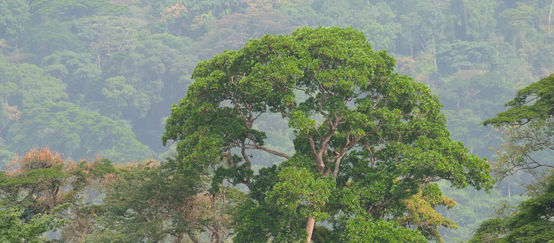
Le gouvernement de la province de Cross River a enfin abandonné son projet controversé d’autoroute, qui aurait traversé l’une des dernières forêts tropicales, dont un Parc national, au Nigeria. Une large coalition de défenseurs de la nature, dont Sauvons la forêt, luttait contre le projet depuis 2016.
Payer 180 ans pour une autoroute en pleine forêt vierge !
740 000 euros par mois pendant les 180 prochaines années ! C’est la somme astronomique que le gouverneur de l’État fédéral nigérian de Cross River entend verser à l’entreprise de construction Messrs Sydney, chargée de la construction d’une « super autoroute ». Difficile de ne pas y suspecter une tentative d’enrichissement personnel…
Les Ekuri sauvent 5.200 km² de forêt tropicale !
Succès au Nigéria : le gouverneur de l’État de Cross River a décidé de restituer à la population de vastes zones de forêts tropicales qu’il les avait expropriées pour la construction d’une autoroute. 5.200 km2 sont ainsi épargnés. Néanmoins, le projet n’est pas abandonné. Et la mobilisation du peuple Ekuri se poursuit.

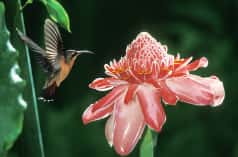
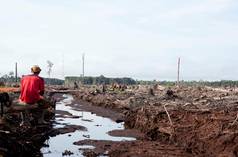





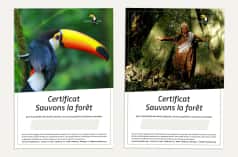
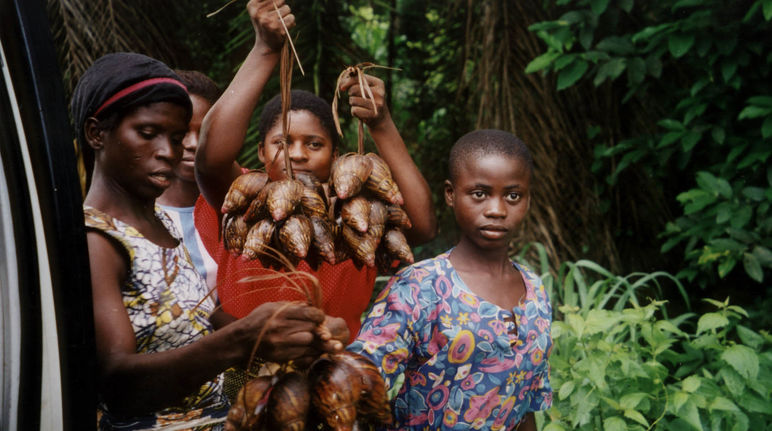

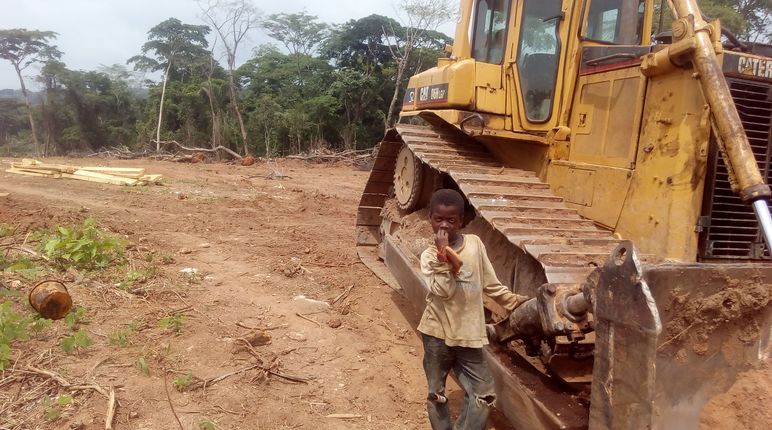
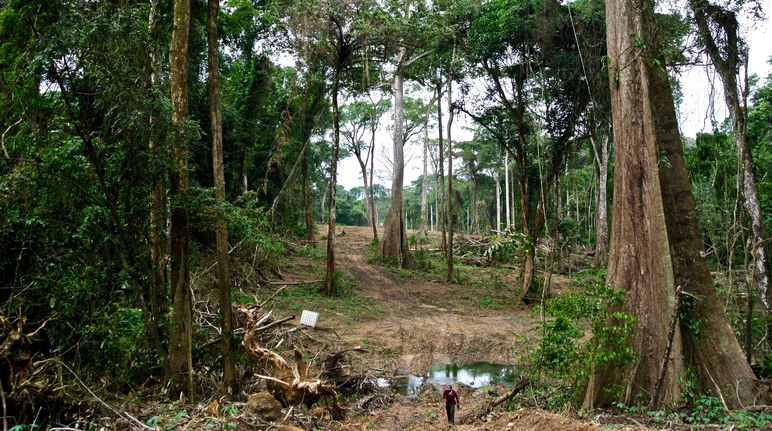
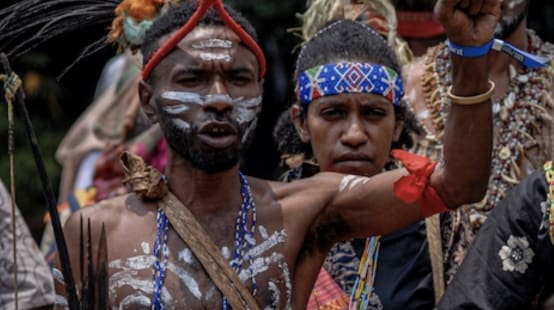
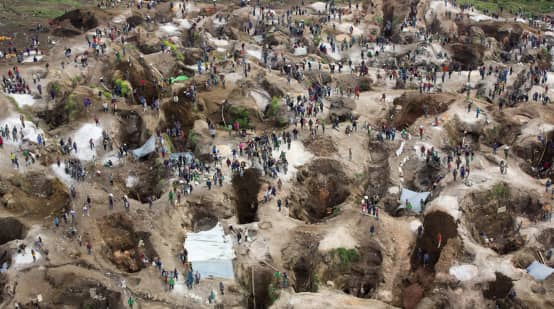
 Succès actuels
Succès actuels